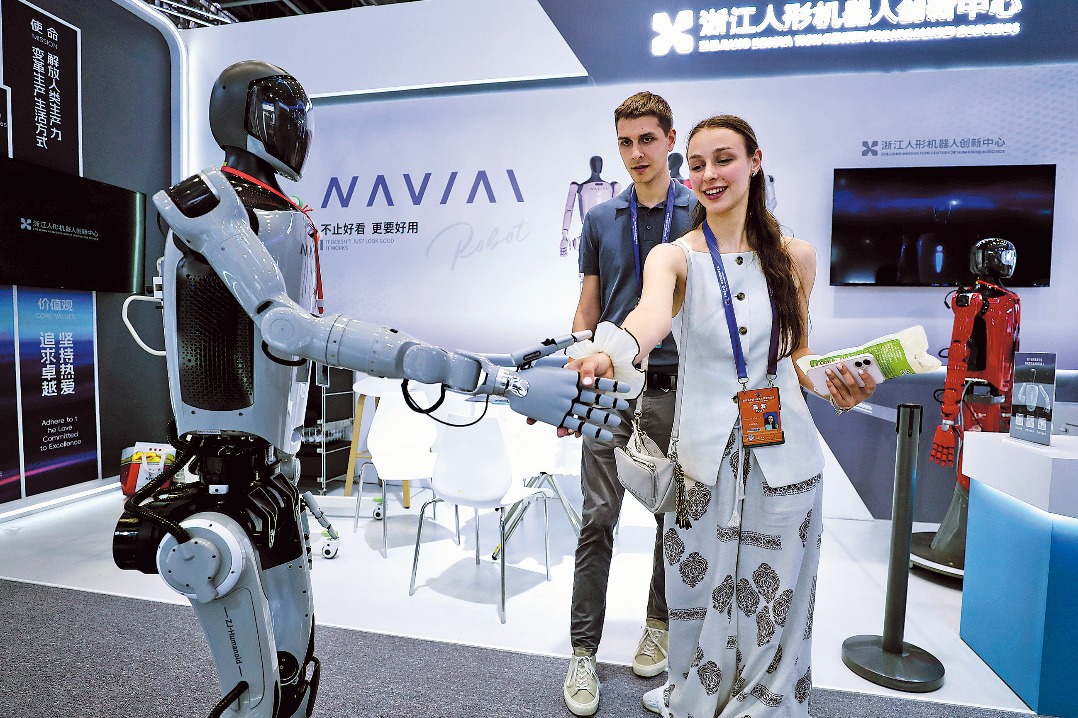Banking on digital technologies

Companies must look beyond only improving efficiencies, and instead focus on generating a holistic approach that drives sustained growth
Constant technology change is offering huge potential for Chinese manufacturers to derive profitable growth from it. China is renewing the engine as it pursues a service-driven economy amid a technological revolution. It's also pursuing more emerging opportunities as it seeks to go deeper in global value chains.
In building a real manufacturing power out of the world's factory, China is addressing some pressing problems like overcapacity and weak demand. Revenue growth has slowed, profitability has stagnated and in some cases declined in the manufacturing sector. It's imperative for companies to transform and stand up to challenges in achieving the Made in China 2025 strategy.

Achieving a manufacturing upgrade could be a long and hard journey. Consultant Accenture's recent research found that only 4 percent of Chinese manufacturing companies are significantly outperforming their industry peers by translating their digital investments into stronger financial performance and becoming digital high performers. The majority have achieved neither improved financial performance nor higher digital performance.
The ideal is to enhance efficiency through combined technologies and generate more sustained growth in more closely collaborated digital ecosystems. Most notably, the high performers apply digital technologies and strategies to both their core business and to new technology-enabled business models. They use growth in the core to generate the investment to take advantage of new market opportunities.
Companies must completely reinvent their operating models, production and value chains to create more value with digital, in a process we call Industry X.0.
While China enjoys some advantages, such as mature manufacturing bases, fiscal support, a large base of tech-savvy consumers and more platform players, the hurdles are as obvious.
In addition to the challenges of rising labor and material costs, the piecemeal deployment and implementation of investment in digital technologies hinders the ability of Chinese businesses to innovate with connected and intelligent products.
In general, Chinese manufacturing companies, like their Western peers, are in the early stage of digitalization of their businesses. Accenture's Digital Performance Index modeling shows the digital high performers will lead in every aspect of digital transformation, from planning and manufacturing to selling and service.
According to the Chinese index, digital high performers outperformed the digital leaders by 67 percent on revenue growth and 98 percent on profitability. Similarly, they generated more sustained and profitable growth than business leaders - those who perform relatively well financially without having made strong digital commitments in the past. The digital high performers enjoy higher investor confidence, as indicated by 14 percent higher "future value" compared with business leaders.
Some problems on the checklist of Chinese manufacturers are operational efficiency, asset utilization, productivity, the imbalance between demand and supply, and high service costs, according to Accenture's study.
Business leaders in China understand the power of digital. They see the potential for digital technologies to bring about transformation and growth and are making big investments in a variety of leading technologies.
Still, many aren't getting the most out of their digital investments. The challenge is that to do so requires a commitment to digital transformation across the full breadth of their business activities. Also, a careful balance of transforming core businesses while scaling new ones is needed in managing the pivot.
Embracing digital strategies in parts of the company, or merely in customer-facing channels, does not amount to true digital transformation. Companies must look beyond only improving efficiencies, and instead focus on generating a holistic approach to digital that drives sustained growth in new digitally contested markets.
To achieve both high digital and financial performance, manufacturing companies can embrace the following principles from "plan, make, sell and management". Companies should first enhance digital strategy, targeted at identifying and capturing opportunities within and outside of current industry boundaries. It's also a must to apply digital technologies (including mobile, cloud, analytics, robotics, cybersecurity, internet of things), which are key to enabling innovation, from design to production of new products and services.
Take Midea, a leading appliance manufacturer in China, which put significantly digital-wise investments into both hardware and software such as cloud, mobile applications, consumer analytics and robots. Its kitchen appliances arm was able to improve productivity and shorten its delivery period by 50 percent. The open-minded company shares the data along its value chain to encourage end-to-end productivity efficiency drives.
On the other hand, generating customer insights using big data to create hyper-personalized experiences across digital and physical channels paves the way for value creation with new business models. Last but not least, digital transformation is a new driver of change, touching not only processes but also culture and talent, all of which will enable established organizations to become more agile and competitive.
By doing so, companies can identify and release value in all parts of their organization and across their ecosystem. Machines and software systems alike are synchronized to unlock cost efficiencies, thus driving up investment capacity. Enhancing customer engagement will further help grow core businesses.
Most Chinese companies looking for higher future values want new efficiencies, new growth and new experiences to be delivered all at the same time. By growing into an Industry X.0 business, enterprises can acquire the merits of smart, connected, living and learning to accommodate the needs.
Industry X.0 is how Accenture defines the digital reinvention of industry, not constrained to the manufacturing sector, when businesses use advanced digital technologies to transform their core operations, their worker and customer experiences and, ultimately, their business models.
Globally, we find that companies that leverage the right combination of new technologies can boost both savings per employee and market capitalization.
While they vary across industries, the combination of technologies - including 3-D printing, artificial intelligence, augmented and virtual reality, autonomous robots, autonomous vehicles, big data analytics, blockchain, digital twin, machine learning and mobile computing - can have a significant impact.
For instance, companies in the industrial equipment sector could realize additional cost savings of more than $43,000 (37,000 euros; £32,700) per employee if they combined robotics, AI, blockchain, big data and 3-D printing technologies. Energy companies could gain more than $16 billion in market capitalization if they combined technologies such as virtual reality, big data and AI.
New levels of efficiency are achieved in the core of research and development, engineering, production, manufacturing and business support through integrated systems, processes, sensors and new intelligence. Worker and customer experiences are reimagined and redesigned through personalization and advances such as immersive, augmented and virtual reality. New business models and revenue streams are unlocked by smart, connected products, services and plants that are enabled by new ecosystems.
It is expected that key digital technologies will create new jobs as companies reinvent themselves. The deployment of connected and intelligent products, systems and plants will lead not only to the addition of new responsibilities to existing roles, but also to the creation of entirely new roles. Sourcing, training and retaining talent with digital-ready skills and encouraging active collaboration between people and machines will thus be must for businesses to bank on digital technology combinations.
Yu Yi is digital lead for Accenture Greater China. The views do not necessarily reflect those of China Daily. The views do not necessarily reflect those of China Daily.
(China Daily Africa Weekly 11/03/2017 page12)
Today's Top News
- EU has much to learn from China-Global South ties
- Xi holds phone conversation with Merz
- Xi stresses high-quality cultural-ethical advancement
- Trump halts Harvard's intl student enrollment
- Xi's visit gives impetus to our work
- Financing support enhanced for micro, small companies






























